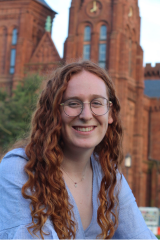UChicago students Georgia Wluka and Elena Tiedens, both rising fourth-years, have been recognized by the Udall Foundation for their commitment to environmental work: Georgia has been named a Udall Scholar—UChicago’s first since 2006—and Elena has earned an Honorable Mention, UChicago’s first since 2016.
The Udall Undergraduate Scholarship honors the legacies of Morris K. Udall and Stewart L. Udall, whose careers significantly impacted Native American self-governance, health care, and the stewardship of public lands and natural resources.
The scholarship identifies future leaders in environmental, Tribal public policy and health care fields. As a Udall Scholar, Wluka will receive $7,000 to be applied to her education, as well as an invitation to a multi-day Scholar Orientation this summer with the rest of the Udall Scholarship cohort. She was one of 55 students selected for the award nationwide, while Tiedens was one of 55 to receive Honorable Mention.
“I’m looking forward to sharing ideas, experiences and excitement about the future of the environmental movement with like-minded changemakers,” Wluka said.
Below, hear from both students on their work in the fields of sustainability and environmentalism.
Georgia Wluka
When Georgia Wluka was an intern at Environment America, a federation of state-based environmental organizations, her supervisor asked her a question she has often asked herself: “What keeps you hopeful?”

Her response was an idea that she has held onto closely as she has entered the field of environmental and energy policy.
“I’m terrified for the future,” she responded, “but doing work like this makes me feel like we have a chance.”
Over the past few years, as she has begun to explore various spheres of environmental work, she has come to see climate policy—particularly energy policy—as the most effective way to make scalable, lasting, impactful change.
Wluka has dedicated considerable time towards advocating for UChicago and other universities to divest from fossil fuel companies, and learning from local leaders across the country who are matching environmental solutions to the intersectional needs of their communities.
“The clean energy transition is undeniably daunting—fossil fuel use is baked into the way we operate,” she said. “However, the breadth and depth of potential solutions matches the scale of the challenge: clean energy solutions can benefit public health, social access, food systems, economic opportunity and cultural connection, too.”
Ultimately, Wluka plans to dedicate her career to furthering the just, rapid and equitable transition to clean energy, and centering the leaders on the frontlines of the climate crisis in the process.
She said that the Udall Scholarship is an “immense honor” that should be shared with the countless people she has learned from along the way, including teachers, mentors, co-organizers and friends.
“In particular, I would like to recognize the professional and academic mentorship of Johanna Neumann, Molly Brind’Amour, Alison Davis and Karlyn Gorski, as well as the members of the Environmental Justice Task Force who continually challenge me to expand my understanding of, and deepen my commitment to, the field of environmental work, and my family, who keep me grounded and hopeful,” Wluka said.
Elena Tiedens
Elena Tiedens has long been interested in environmental sustainability, and was first drawn to it because of her love for nature. Since she was in elementary school, she has backpacked and hiked across California, Wyoming and Utah.

“I’ve realized that climate change does not only affect the natural spaces that I love, but is also the product of distinct historical circumstances rooted in differential political and economic power,” she said. “Climate change is thus not only an environmental problem, but a social one.”
Since anthropogenic climate change has already caused rising global temperatures, Tiedens said, the task now is to mitigate further damage while adapting to new climates and ecologies, which may unevenly affect people and other species across the world.
Tiedens is involved with a number of groups on campus focused on the environment and sustainability, and has worked with community stakeholders to organize cleanups and plantings in local parks, including nearby Midway Plaisance Park.
“I would like to thank my professors for thought-provoking lectures, discussions, and conversations,” Tiedens said. “And, I would like to thank the College Center for Research and Fellowships for their encouragement and advice in the Udall process.”